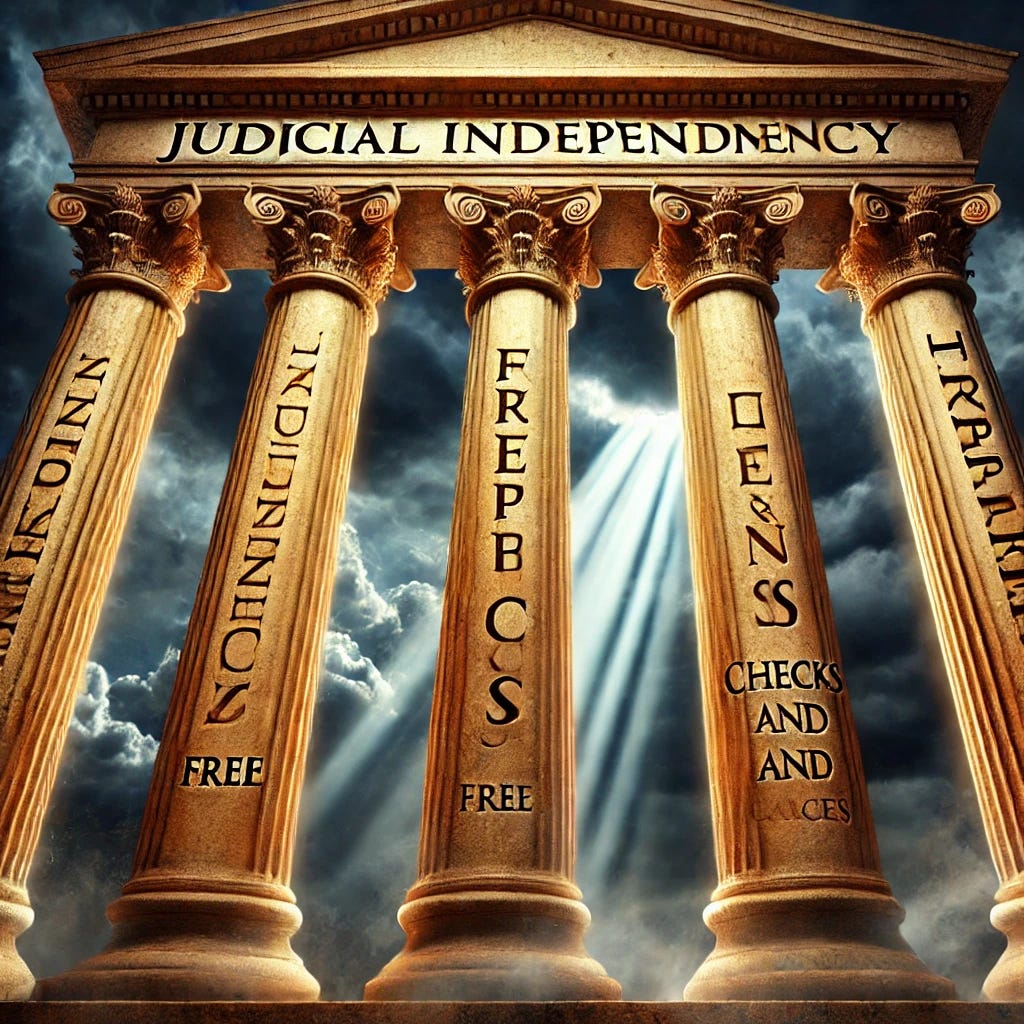What specific checks and balances failed?
The current concerns about American democracy and the resilience of its checks and balances center on several specific areas where these mechanisms have been perceived to falter or be vulnerable. Here are some specific checks and balances that have faced significant challenges:
1. Judicial Independence and Politicization
Partisan Judicial Appointments: The judiciary is intended to be an independent arbiter, but over the last few decades, judicial appointments, especially to the Supreme Court, have become highly politicized. This has led to perceptions that decisions may be influenced by partisan loyalty rather than impartial interpretation of the law.
Lifetime Appointments and Court Balance: Lifetime appointments in the judiciary are designed to protect judges from political pressures. However, as the balance of the court shifts with each administration, this system has led to long-term ideological shifts that can feel unrepresentative of the current public will, leading to concerns about accountability.
2. Legislative Oversight of the Executive
Executive Orders and Emergency Powers: The increase in executive orders and the expansion of emergency powers have allowed presidents to bypass Congress on critical policy issues. These actions can diminish the legislative branch’s role as a check on the executive, especially when Congress is polarized and unable to provide unified oversight.
Inadequate Congressional Oversight Committees: Congressional committees are meant to provide oversight of the executive branch, but when Congress is highly polarized, these committees can become gridlocked or less effective. Partisan loyalty has, at times, limited these committees from holding the executive accountable.
3. Checks on Presidential Powers and Accountability
Impeachment Process Challenges: The impeachment process, as seen in recent history, is a powerful check on the executive branch. However, its effectiveness has been questioned when partisanship prevents a trial from proceeding fairly or reaching a conviction, even with significant evidence. This has led to debates on whether impeachment remains a viable tool for holding presidents accountable.
Special Counsel Investigations and Executive Privilege: Investigations into executive actions are intended to hold leaders accountable, but executive privilege and resistance to subpoenas have increasingly hampered the process. When members of the executive branch refuse to comply with investigations, accountability can be limited unless the courts act swiftly to enforce compliance.
4. Congressional Power of the Purse and Government Shutdowns
Government Funding and Shutdown Tactics: The power of the purse is one of Congress’s most significant checks on the executive, yet frequent government shutdowns have exposed weaknesses in this system. When budgetary negotiations are weaponized for political leverage, it hampers the government’s ability to function and undermines this check.
Use of Appropriations for Partisan Agendas: Recent administrations have, at times, shifted funds toward their priorities without clear congressional approval, challenging the traditional role of Congress in budget allocation and oversight.
5. Media Independence and Freedom of Information
Discrediting and Undermining the Media: An independent press is vital for transparency and accountability, but when leaders discredit media outlets as “fake news” or “enemies of the people,” it undermines public trust in journalism and limits the media’s role as a check on power.
Information and Transparency Limits: Freedom of Information Act (FOIA) requests are intended to make government actions transparent, but these requests can be delayed or denied, limiting the public’s access to crucial information about government actions. This can obstruct the media’s ability to fully investigate and report on government activities.
6. Partisan Gerrymandering and Electoral Integrity
Gerrymandering: While state governments are responsible for drawing electoral districts, extreme gerrymandering has led to situations where some state legislatures can remain in power despite shifts in public opinion. This weakens the principle of fair representation and undermines the electoral check on government power.
Voter Suppression Laws and Access Issues: Measures that restrict voter access—such as stringent voter ID laws, purging voter rolls, or limiting mail-in voting—have been criticized as suppressing voter turnout, which reduces the democratic check on elected officials.
7. Weakening of Norms and Informal Checks
Erosion of Norms and Ethical Standards: Informal checks, such as ethical standards and norms of conduct, play a significant role in maintaining democratic stability. Recent years have seen a weakening of these norms, with some officials disregarding established practices for transparency and accountability.
Use of Political Office for Personal Gain: When leaders use political office to further personal or political interests—whether through nepotism, conflicts of interest, or other ethical breaches—this undermines public trust and can distort government priorities away from serving the public.
Addressing These Challenges
To strengthen these checks and balances, various reforms have been suggested:
Judicial Term Limits or Rotation: Some propose term limits or rotating seats for Supreme Court justices to reduce partisanship and better reflect current public opinion.
Strengthening Congressional Oversight: Improving subpoena enforcement and reinforcing the role of oversight committees could enhance congressional accountability mechanisms.
Transparency Reforms: Ensuring faster FOIA processing and reinforcing protections for whistleblowers could improve media transparency and public access to information.
Protecting Electoral Integrity: Addressing gerrymandering, protecting voter rights, and improving voting access would enhance the electoral system’s role as a check on power.
Codifying Ethical Standards: Enacting laws that formally uphold ethical standards for public officials would reinforce accountability and restore trust in governance.
These challenges highlight the importance of maintaining a resilient democracy through active participation, structural reforms, and a commitment to both formal and informal democratic principles. Addressing these weaknesses would not only prevent further erosion of democratic norms but also strengthen the foundation of American governance for the future.


